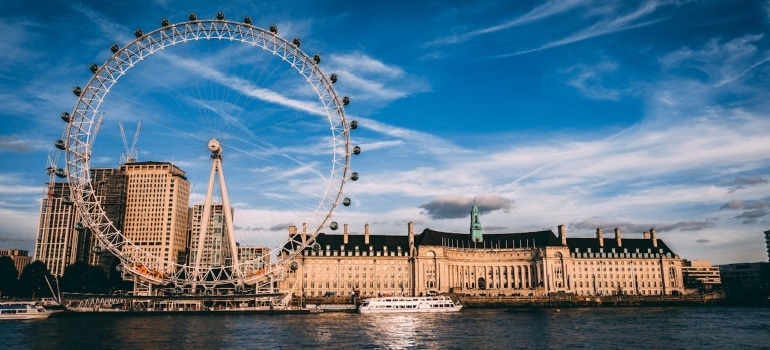Adjusting to Life in the UK as an American Expat

Get a Free Moving Quote Now!
Start Your International Moving Journey





Moving from the US to the UK is an exciting opportunity, whether it’s for work, education, or simply as a new way of living. The countries speak the same language, and there is no shortage of cultural ties, but everyday life in Britain can still come as a bit of a shock. Culture shock is to be expected, even somewhere that seems familiar until you scratch the surface.
This guide can prepare you for what to expect and how to confidently adjust when you move.
Understanding Culture Shock
It’s culture shock. When what you’re accustomed to does not match up with what the new place expects of you. American and British lives may seem almost identical from the outside, but variances in communication, etiquette, and routine can feel bewildering for anyone moving to the UK from the USA.
Most expats experience four stages:
- Honeymoon Stage: They like that everything downstairs is so fresh, cute, and life-altering. Historic towns you tour, local foods you enjoy, and your new surroundings you soak in.
- Frustration Stage: Even minor differences can become bothersome or puzzling—indirect communication, sluggish service, alien housing arrangements, and unfamiliar types of transportation.
- Adjustment Stage: You learn how things work so that you can pick up local lingo and navigate daily tasks more confidently.
- Acceptance Stage: The U.K. starts to feel like home. You easily mix American customs with British etiquette.

Knowing these stages can help normalize the process and minimize anxiety.
Key Differences Between American and British Culture
Even with a shared language and history, daily life here can seem very different.
Communication Style
Americans tend to say what they mean and be expressive, whereas the British are known for understatement and many subtle hints. “That will be tough” can mean “no,” and “not bad” often means “very good.” (Humor is also layered—dry and sarcastic, with a straight face).
Social Etiquette
Politeness is in the very fabric of Britishness. Queueing is strict business; promptness is de rigueur, and everyone respects each other’s space. Small talk is typically lighter and less personal than in the US. Tipping is less, and a service charge is often included at many restaurants.

Workplace Culture
British offices are also more formal and structured with meetings and teamwork; they rely a lot on implication. There is a good balance between work and life, with employees typically taking all of their annual leave and rarely seeing after-hours emails.
Food and Dining
Portions are typically smaller, and meal times last longer as people chat. While UK food might be different from what you’re used to eating in America, the likes of roast dinners and fish & chips will become some of your staples. There is no shortage in grocery stores, though some American brands might be harder to come by.
Sports and Entertainment
Football is soccer, and fan loyalty to local clubs runs deep. Rugby, cricket, and tennis are also popular. Television leans toward wit, satire, and long-running drama rather than punch-line-driven humor.

Financial Adjustments & Cost of Living
Money-related contrasts are a primary source of shocks for American expats.
Currency & Cost of Living
The British pound has a higher face-value price, and cities like London are markedly more expensive than many areas in the US. Rent, transportation, and eating out can be pricier, but health care is much cheaper.
Council Tax
Council tax is usually paid directly by tenants in the UK. Rates differ between cities and types of properties.
Banking & Credit
American credit history doesn’t transfer, which can complicate the process of opening accounts or obtaining credit. App-based banks like Monzo and Starling are also easier to set up.
Payment Culture
Contactless payments are everywhere, and chip-and-PIN is the old hat. Nowadays, according to use, debit cards are the most common payment cards (more common than credit cards.)
Navigating Everyday Life: A Guide for American Expats in the UK
Getting into a rhythm with daily routines is a huge part of the settling-in process.
Transportation
Relearning how to drive on the left, on small roads, and on roundabouts takes a bit of time. Public transport, especially in cities, is efficient and well-used—many expats use trains, the Underground, trams, and buses.
But if you’re bringing your car, you’ll likely need to check on international car shipping that can help get your vehicle safely across the Atlantic.
Housing and Utilities
Homes tend to be smaller, and many are not air-conditioned. Everything is the same, except for the vocabulary I use: “rent” instead of “lease,” “flats” instead of “apartments,” and “letting agents” instead of “leasing offices.” There are boilers and radiators for heat.
If you want to settle down for a bit, you might buy a house abroad. It is important to know the real estate business and local laws of the land when investing such a large sum.
Shopping
Stores in the neighborhood are smaller, goods differ, and brands change. Eventually, you will find local gems and specialty import stores that carry U.S. products.

Healthcare
For those registered with a GP, most NHS care is free at the point of use. Some expats also mix NHS and private care to shorten waiting times.
Weather Adaptation & Seasonal Shock
The UK climate might be quite a change for you, especially if you’re from a sunny or warm state.
Short Winter Days
Some areas may see winter daylight come to an end as early as 4 p.m., and that can impact mood, energy—even brain function.
Light Rain & Cloudy Skies
Expect a lot of gloomy and overcast weather rather than severe storms. Ok, but better water-repellent jackets than an umbrella.
Seasonal Affective Disorder (SAD)
Feeling blue during the first winter is not unusual for many newcomers. Exposure to bright light and outdoor activity in the day could be beneficial.
Adapting to British Social Norms
It’s easier to integrate when you understand local customs.
Making Friends
The people are friendly but also can be a bit self-contained until they get to know you. Subscriptions to clubs and participation in functions and tubs are effective methods for developing connections.
British Humor
As you read, think dry wit, sarcasm, and self-deprecation. Among friends, teasing is normal and often—albeit not always—affectionate.

Holidays and Traditions
Festivals, such as Guy Fawkes Night, Boxing Day, or local summer events, are a valuable source of learning about British community life and make for an excellent chance to get involved with the local culture.
Regional Differences Across the UK
After all, the UK’s various regions have very different identities.
- England: It’s a juxtaposition that sees fast-paced cities such as London rub with the more relaxed countryside towns
- Scotland: A welcoming people, a rich cultural heritage, and its legal and education systems
- Wales: Delightful views, small communities, and double signage—everything you could want
- Northern Ireland: Warm people, fascinating history, and some unusual cultural dynamics
- Accents & Dialects: You can expect a big range—some might take some getting used to

Spend time research your new country and its regions. From Cornwall’s coast to the culture of Edinburgh, there is something that appeals in each region. Don’t be afraid to travel and get lost in the UK’s various scenic spots and communities.
Americanisms & Etiquette Mistakes to Avoid
Steer clear of misunderstandings, and your journey will be smoother.
Phrases & Behaviors
- Say “toilet,” not “restroom.”
- “College” in the U.K. means pre-university courses
- Do moderate your voice in public places
- Heavily enforced queueing rules cannot be ignored—no cutting lines
- Tipping is optional and modest
These little differences will also make you fit in more easily.
Coping with Homesickness
Contacting family and friends back home, tracking down American goods, plugging into expat networks, and getting to know your new neighborhood are all tactics that can help you resist homesickness. Routines and open-mindedness make the transition go down easier.
Final Thoughts
There are fantastic prospects for personal and professional development if you move to the UK as an American expat. The cultural differences will likely shock you at first, but knowing about them—and being open to learning more—can make the transition less difficult.
Approach it with an open mind, some patience, and curiosity, and you will find your place in British life—which can be both rewarding and combine the best of both worlds.
FAQs
Why do Americans get culture shock in the UK?
What with so many of our everyday standards—speech, manners, and humor—being slightly more different than I would have imagined but for the fact we do share a common language.
Is British humor hard for Americans to understand?
Yes, British humor is sly, deadpan, and snarky, often presented unexpectedly, like being crammed into a plate of mashed potatoes without any warning.
What do U.S. expats find most confusing?
Non-verbal communication, queuing culture, housing differences, and unfamiliar day-to-day vocabulary.
Are English workplaces tough on Americans trying to fit in?
They might, because of formality and understated communication and deeply ingrained work-life balance.
How do Americans cope with indirect British communication?
Americans cope with indirect British communication by paying attention to the right context, observing tone and reading between the lines, and accepting that “maybe” frequently means no.
